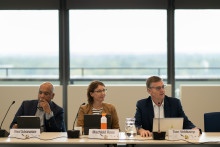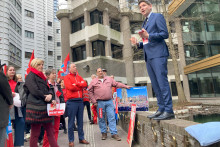With this statement, the Executive Board has not yet made a decision. It is however a matter of time before a decision will be made. This announcement was intended to inform the University Council at an early stage, Vice-President Machteld Roos said. 'We are in the middle of the process of drawing up a budget for next year. In addition, there is a lot of pressure from The Hague. Given those challenges and our austerity targets for the coming years, we need to change. That's why we're discussing this at an early stage: we do not rule out the possibility of a UT-wide organisational change.'
How is employee participation regulated?
The main point of contention between the University Council and the Executive Board on Wednesday morning was the way in which employee participation is arranged in the event of an organisational change. In other words, at which table is a decision made and discussed? And above all: who has the right – or not – to consent to this?
According to the Executive Board, the current scheme is inadequate, in view of the upcoming severe government cutbacks. The crux: it is to be expected that several organisational changes will have to take place within UT faculties and service departments. Probably not at the same time, but they will influence each other.
Right of consent or advice
The idea is that because the UT units are so intertwined, one organisational change cannot be separated from the other. The Executive Board's proposal is therefore to introduce a new regulation, in which any organisational change or reorganisation at unit level is seen as a 'cross-unit' change.
What the council disagrees with, is the procedure to be followed proposed by the Executive Board. According to the new procedure, the right of consent of the decentral participation bodies – a service council or faculty council – would be replaced by a right of advice. And neither the University Council nor the decentral participation bodies want that.
For the time being, only the Faculty of Science & Technology recently announced a formal reorganisation. That is why it will be up to the Faculty Council of S&T in the coming period to decide whether or not to approve a reorganisation plan of their Faculty Board.
Emergency brake
Although no one explicitly announced a UT-wide reorganization or organisational change, it is a matter of waiting and seeing when that moment will present itself. University Council chairman Herbert Wormeester wondered aloud whether the UT is not already undergoing a de facto organisational change. 'A little over a year ago, the Executive Board pulled the emergency brake, including a hiring freeze. Something like this is a temporary measure, as a university you can't move forward if the emergency brake is on.'
So, Wormeester said: either opt for a structural solution, or let go of the brakes. 'The current measures are creating holes in the organisation to reduce the density. People already have to adapt their work. In a way, it smells, looks and tastes like a broad organizational change. That's why we need to clarify this.’
But there is no official ‘label’ on the situation – yet.







